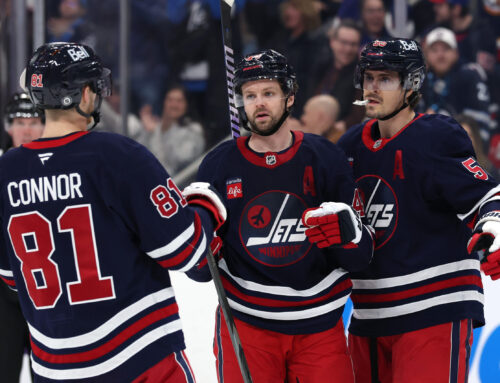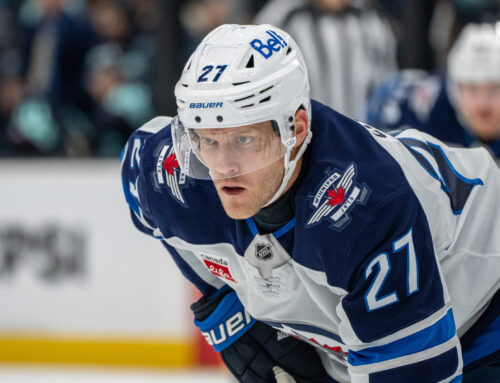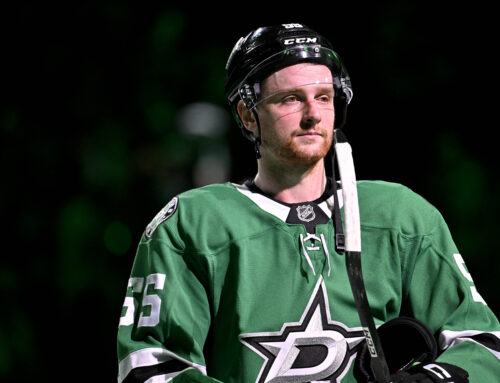This week we will look at some regression candidates from the Western Conference. We will focus on shooting percentage, PDO, 5on5 shooting percentage and secondary assist percentage to see where the players below were outside the norm in 2023-24.
Shooting percentage is self explanatory as it will affect goals, whereas PDO can be an indication that the team or the player was perhaps too lucky while that player was on the ice and it could reduce goals, assists and/or plus-minus but not necessarily all three at once. Secondary assist percentage will affect the number of assists.
If I mention all four of the categories with one player, it is not a good sign.
Anthony Mantha has a career shooting percentage of about 11-12 percent and came close to his career-high of 25 goals with 23 in 2023-24 on a 20.5 shooting percentage. He averaged just 1.5 shots on goal per game, whereas he had a career-average around 2.3/g. I'd expect 15-20 goals as a Flame. His 5 on 5 shooting percentage was high at 11.3 and his secondary assist percentage was higher than previous years at 47.6%.
Blake Coleman had a career-high 30 goals in 2023-24 averaging 2.4 SOG/g which is his career average. He might reach that again, but the career 10.4% shooter is unlikely to reach 25-30 goals again. His secondary assist percentage was high at 58.3 compared to the prior two seasons at around 40-42 percent.
Zach Hyman had a breakout 2023-24 with 54 goals. His SOG/g went from 3.5 to 3.6 from the prior year, but his career shooting percentage is 13.6. I'd be wary of him repeating as a 50-goal scorer, but we did learn last week that he dominated the NHL in shots on goal from the high-danger zone, which contributed to his higher shooting percentage. It's not easy to get into those tough areas for 80 games, so I'd be more comfortable with Hyman at 40-45 goals in 2024-25.
Jake Neighbours hadn't scored 27 goals in a season at any level since he put up 29 in 2016-17 as a 14-year-old. Injuries had a lot to do with it as he hadn't played more than 64 games either until he managed 77 games in 2023-24. His career shooting percentage was 11.8 in his first 52 NHL games. He is unlikely to see 27 goals again unless he becomes a fixture on the power play.
Nils Hoglander had a career-high of 24 goals in 2023-24 on just 120 SOG which was 1.5/g. His career shooting percentage was around 11 percent before and he had been as high as 2.2 SOG/g through 60 games in 2021-22. He had a PDO of 104.6 and he's unlikely to shoot 20 percent again, so he will likely fall to the 15-20 goal range.
Brock Boeser has averaged 2.7 SOG/g in his career and has a shooting percentage of 13.8. If he is healthy and his game is on, I think he could be around the 16 percent range but 19.6 is a little high to maintain. He also played in 81 games in 2023-24 after never playing in more than 74 in his first six NHL seasons. If he can play 75 games in 2024-25, he should be good for 27-32 goals but 40 might be a stretch again.
J.T. Miller had a high shooting percentage (19.1), a high PDO of 105.5 and a high 5 on 5 shooting percentage of 12.9 while he was on the ice. He's unlikely to score as many goals as he did (37) and probably won't have the same offensive contribution from his teammates that allowed him to post 66 assists in 2023-24. Three of the four indicators say that he will struggle to reach 100 points again.
Tyler Seguin had a PDO of 103.7 and a 11.0% 5 on 5 shooting percentage. He had never been above 10.58% in any of his prior 13 seasons. He had a bit of a resurgence 2023-24 where he had 52 points in 68 games (0.76/g) after averaging between 0.6 and 0.72 the prior four seasons. All signs are pointing to his production dipping a little from 2023-24.
Quinn Hughes had a slightly elevated shooting percentage of 8.5 in 2023-24 after being around five percent previously. That helped him shatter his career-high of eight goals as he put up 17. His PDO was slightly high at 103.7 but not nearly the highest on the Canucks. His secondary assists went from around 47 or 48 percent to 53 in 2023-24 which might have accounted for only four or five assists on the year. If healthy, Hughes should be good for 10-15 goals and 60-70 assists.
Filip Hronek had a very high secondary assist percentage in 2023-24 at 67.4 combined with a PDO of 104.1 and a high 5 on 5 shooting percentage of 11.9. He finished with five goals and 43 assists in 81 games which were career highs in assists and points. His statistical hit in 2024-25 will likely be 8-12 points and his plus/minus (he was a plus 33).
Cale Makar could struggle to duplicate the 69 assists he had in 2023-24. His secondary assist percentage had been between 38.9 and 42.1 in three of his first four seasons, but was 59.4 in 2023-24. It could be the difference of 12-14 assists in a year.
Jason Robertson had 63 assists in 82 games in 2022-23 with a secondary assist percentage of 38.8. It might be a bad sign for Robertson moving forward as he had 51 assists in 82 games in 2023-24 with a secondary assist percentage of 54.9. It would be more encouraging for 2024-25 if the percentage was reversed for each of those years.
Joel Eriksson Ek had a similar situation as Jason Robertson above. In 2022-23 he had 38 assists in 78 games with a secondary assist percentage of 42.1. In 2023-24 he dipped to 34 assists with secondary assists at 55.9.
Ryan O'Reilly had 43 assists in 82 games with Nashville in 2023-24 which was the most he had put up since he had 49 in 2019-20 when with St. Louis. The difference being that when he had 49 assists, his secondary assist percentage was 44.9 compared to the 65.1 for his 43 in 2023-24. Thanks for reading and if you have any questions or players you'd like me to look at please message or follow me on Twitter@gampbler15.





 EDM
EDM PIT
PIT TOR
TOR VAN
VAN FLA
FLA MIN
MIN DET
DET COL
COL S.J
S.J
